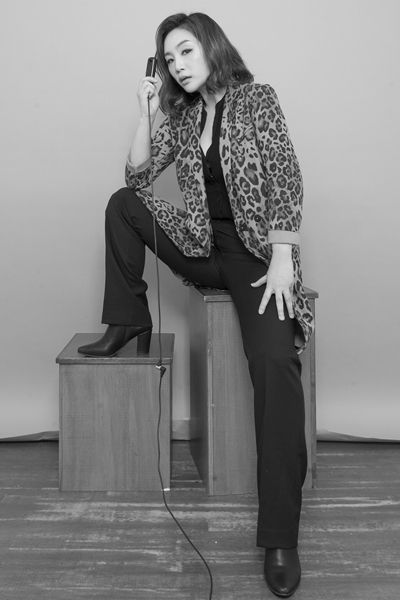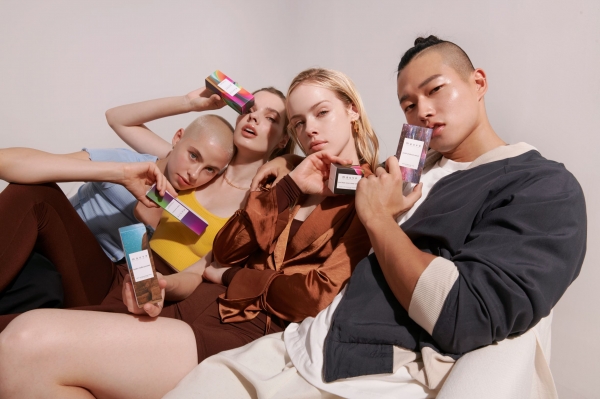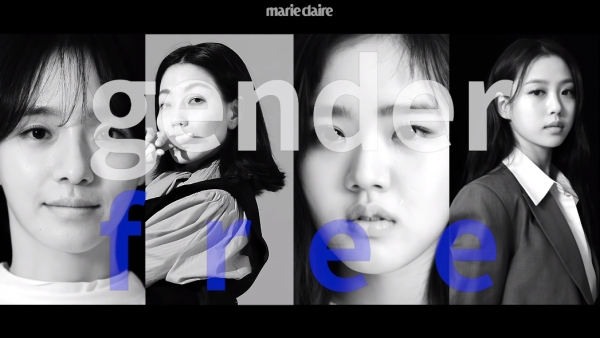Age, nationality, ethnicity and religion are just some of the categories that people fall into. Among them is also gender and it plays a significant part in forming our identities and assigning expected roles. Recently, however, a growing number of people are identifying “gender-free” as neither male nor female. Magazines such as “Marie Clair Korea,” the beauty brand “Mauve Fantastic Ever,” and stage actress Lee Young-mi are those paving the way for gender-free in South Korea.
Gender-free casting: Lee Young-mi on acting as a male

Women are making great strides across all forms of life, including politics and business. But in theatre, things are a little different. It is still difficult to think of seeing Shakespeare’s Hamlet on stage being portrayed by an actress. In Hamlet, for example, there are only two characters that are traditionally portrayed as women – Ophelia and Gertrude, amongst a large cast of male characters. But, as gender-free casting is taking shape, actresses are taking up roles traditionally played by actors.
The performance industry in Korea first embraced gender-free casting in 2015 when the first gender-free character, a female King Herot from the play “Jesus Christ Superstar” was introduced.
Veteran stage actress Lee Young- mi, an Ewha graduate who majored in the Department of Political Science & International Relations, took up the male role of Griswold in the play “Edgar Allan Poe” in 2019. Before playing Griswold, Lee also portrayed the role of a man named Yitzhak in the play named “Hedwig.”
Initially, Griswold was acted by a male actor, but was later considered in the production's attempt to pursue diversity.
“It was a definite win-win for the audience and for me,” Lee said. “This was because the change of the gender allows the audience to enjoy different appealing points of the character in many ways. At the same time, I can pass on a wider range of performances, different from those roles that only emphasize femininity of the character.”
According to Lee, she did not have any doubts about her ability to play in a traditionally male role when it was offered to her despite the differing gender roles.
“I reminded myself on stage that I was acting Griswold, the character itself, trying not to be too conscious of the fact that it is a male character,” Lee said. “Looking like a man is not the most important factor in gender- free casting. Rather it is important to focus on the details in expressing delicate emotions that other actors failed to express. If manly acting was the point, why not use a male actor in the first place?”
Similarly, Lee portrayed the male character Yitzhak in the play “Hedwig.” In this play, Lee was acting as a male character in pursuit of love from a woman who did not love him in return.
“The role of Yitzhak was very different from the role of Griswold,” Lee said. “Because the play ‘Hedwig’ itself originally contains gender- bent characters, I felt pressured as an actress to express Yitzhak because a slight change of expressing emotions could thoroughly impact the show.”
For Lee, portraying the male character of Yizhak was a critical moment in her career as an actress. It was a rewarding experience to play a male role that was not confined to a role based on showing her body or being attractive.
With gender-free castings making way for more actresses and actors, it seems as though the idea of gender- free characters is not a passing theme of our time. Slowly, it is solidifying itself in the history of performance and stage art. Actresses such as Lee have the desire to express characters without the limitations that gender traditionally puts on them. Instead, there is a growing movement to witness a character as a human- being.
“We already had our first female King Herot in 2015, female Hamlet and a male Ophelia in 2018,” Lee said. “Why hesitate in front of your dreams, when such efforts are made to break the glass ceilings?”
However, according to Lee, seeing gender as a mere form of entertainment where imitation is considered a form of entertainment can be risky. She emphasized that if actresses and actors simply imitate gendered stereotypes, such as the deep voice of a male character, it could alienate the audience. This is something that still remains an open issue.
What’s your mauve?: Cosmetics are no longer just for women

Throughout time, beauty, self-care and cosmetics have surrounded women and were seen as feminine expressions. Times are changing, however, and the beauty industry has begun to widen its spectrum. Products are now not simply falling into categories such as “for her” or “for him.”
Mauve Fantastic Ever, a Korean gender-free beauty brand launched in 2019 and aims to create styles that match individual personalities and preferences without being bound by gender stereotypes.
Mauve Fantastic Ever’s brand name is inspired from the color “mauve,” which is similar to a pale purple. Mauve has been recognized as a mystical color by some cultures since ancient times, partly because the color itself was very difficult to produce with paint or dye. June Yoo, the creative director of the brand, says that mauve can be seen as a symbol of preciousness, since it is a color captured at the very moment when the blue and red meet.
“At first sight, we wondered if mauve could resemble our youth,” Yoo said. “Mauve is the color that expresses the confusion that comes from youths, the dreams that youths can dream of, and the process of gradually aging.”
With the beauty of ‘mauve’ combined with a sense of praising the times that will never return, the name “Mauve Fantastic Ever” was born.
The overall theme of Mauve Fantastic Ever portrays the space, which is a means to express mystique. Most skincare products in Korea depict a white image and generally speaking, the brighter things are the better. The decision disregarding the standard make- up themes was unconventional when the brand was introduced to the public. For Yoo, the image of space and its endless massivity and limitless freedom best conveys their message of breaking down discrimination and barriers between both men and women.
“We first started out as a gender-neutral brand because we wanted people to look deeper into themselves, and find their uniqueness other than femininity or masculinity,” Yoo said. “People who think like us are increasing, and that is why we do not think the desire towards gender-neutral cosmetics is a temporary passerby.”
Not all men have oily skin, and not all women have sensitive skin, but the beauty industry has been dividing products for men and women, targeting them narrowly to encourage consumption. Gender- free products are said to be aimed toward our ever-changing bodies and skin-types. Yoo emphasizes that although it is natural to pick a product with functions that improve one’s skin condition, simply buying a product according to one’s gender does not help at all.
According to Yoo, when developing their “Cool Kids Never Sleep” cream, along with others products, she made sure to invite a wide range of people from men and women in their twenties to forties when experimenting products while keeping in line with their idea that cosmetics should not be concentrated towards a certain group. She also eliminated any ingredients that might irritate the sensitive skin in any way. This can also be seen in their product language where words that emphasize femininity or masculinity are absent.
Mauve Fantastic Ever spends the majority of the time neutralizing the product. Research is done to avoid using classic words of femininity and masculinity, and they make sure the models photo shooting with the products take gender-neutral poses.
The gender-free movement has been gaining momentum across product lines over the years, and these cosmestics are just one of the many that are now pushing a gender-free message. For Yoo, this has always been her goal and claims that more people are becoming accustomed to men also using cosmetics.
Yoo pointed out “strength” as the core difference between Mauve Fantastic Ever and other gender- neutral beauty brands.
“I do think it is time to raise our voices,” Yoo said. “Especially in a time when cosmetics are no longer considered as a preserve for women.”
Yoo and her brand, hope that all people no matter what age or gender enjoy their lives in the present moment and that youth is whatever people make of it.
“That is why we constantly throw questions to our customers through our products,” Yoo said. “We ask them: what’s your youth? In other words, what’s your mauve?”
Marie Claire Korea: Male characters’ lines read by actresses

When Marie Claire Magazine launched in Korea in 1993, it was a pioneer in projecting Korea’s fashion magazine industry that also covered women’s health and beauty. Following this, it was also the first publication to plan an event under a gender-free theme.
Inspired by W Magazine’s video of male and female actors and actresses switching their roles in “Gone with the Wind,” Park Min, the features director of Marie Claire Korea, decided that producing gender-free themes was something that they must approach with enthusiasm. The video that was released showed actresses taking on roles of characters that were previously played by men. For instance, Jin Kyung played Hamlet and Kim Yeo-jin played a drunk man hitting on someone in “Architecture 101.” This was a sensational attempt as the audience was more used to males acting these roles.
“The gender free video was not intended to emphasize a certain movie genre,” Park said. “Instead, we wanted to show that there is no breakdown by gender in texts and that this has no influence on acting. I found it disappointing that there were especially lots of male-centered movies over the past few years, so I was grateful when people enjoyed watching actresses act characters normally played by males.”
Casting actresses to play characters traditionally played by males was difficult, however, as there were no references on past performances and some actresses were reluctant to tread on new territory. But some, such as Kim Hyang-gi, who has been working with Marie Claire Korea since her teens relished the opportunity. Park sees the realization of genders meaningless and social constructs are a positive change. She hopes for a day when women can be given more choices regardless of their gender.
“The reason we decided to name this project ‘Gender-free’ was because we hoped for an increase in films and dramas that involve a variety of emotions and stories,” Park said. “We intentionally made the videos in black and white as we found it moreeffective in only concentrating on the actors’ voice and expressions.”
Can female actresses break new ground in traditionally gender based roles? According to Park, actresses need to be more active and not be held down by gender stereotypes and this largely depends on the importance of female directors having the freedom to make gender- free casting decisions.
“I believe magazines should show various aspects of women, instead of the image that the public demands,” she concluded. “The media should realize that they were wrong about seeing women with prejudices and voice out these problems.”

